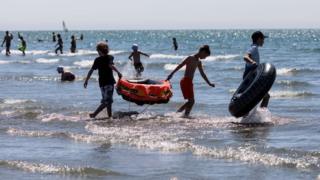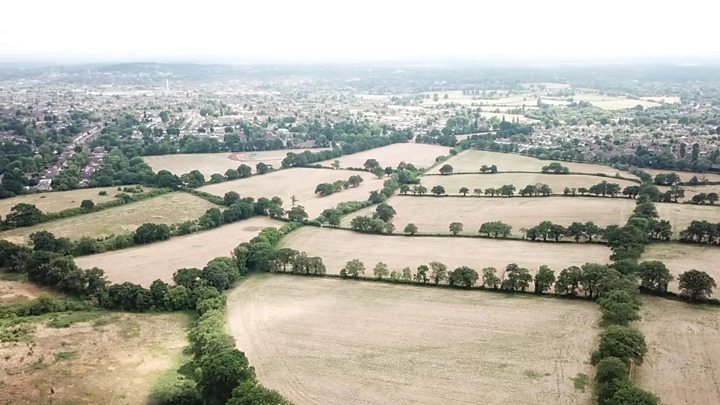UK heatwave: A respite ahead as rain predicted in parts of UK
 Image copyright Getty Images
Image copyright Getty ImagesTemperatures in the UK could hit 34C (90F) in parts of the country, however rain may be on the way.
On Friday, weather fronts could bring outbreaks of rain and even, in eastern parts of the country, torrential downpours.
A thunderstorm warning for northern and eastern parts of England has been issued by the Met Office for Friday.
A level three heat health watch alert is in place for much of the east and south-east England until Friday.
The public are being advised to take shelter from the sun, as the joint warning from the NHS, Public Health England and the Met Office says there is a 90% probability of heatwave conditions until 09:00 BST on Friday.
- How long will the heatwave last?
- UK seawater 'warmer than California'
- World Cup and sun boost supermarket sales
- Welsh ice cream maker's dream summer
 Media playback is unsupported on your device
Media playback is unsupported on your deviceTemperatures remained in the low 30s throughout Tuesday with the highest temperature of 31.4C recorded in Cavendish, Suffolk.
Mercury levels could climb to 33C on Wednesday, while Thursday may see temperatures of 34C.
However this changes on Friday when northern and eastern parts of the country could see as much as 30mm of rainfall in one hour.
The Met Office has issued a yellow warning for these areas, adding that large hail and strong winds will be hazardous.
The hottest July day on record in the UK was 1 July 2015, when the mercury hit 36.7C at Heathrow.
Monday was the hottest day of 2018 so far, with the Met Office recording 33.3C in Santon Downham in Suffolk.
Northern Ireland, Scotland, Wales and north-west England have seen cooler temperatures and even some showers on Tuesday.
But this hasn't stopped Moray Council in Scotland having to offer thousands of homes free bottled water as private water supplies ran dry.
The hot weather has boosted sales at shops, with leading retailers reporting this week that sales of fans have risen by 315% and barbecue sales have increased by 723%, compared to the same time last year.
Meanwhile, Britain's workers have been battling the heat in everything from flame-proof overalls to clergy robes.
Skip Twitter post by @ScottDuncanWX
England not looking so lush and green right now! #ukheatwave #heatwave pic.twitter.com/SV15KUn1zM
— Scott From Scotland (@ScottDuncanWX) July 24, 2018
Report
End of Twitter post by @ScottDuncanWX
Skip Twitter post by @HolyroodRanger
Someone put the plug back in!#HolyroodPark #Edinburgh #Heatwave pic.twitter.com/BuTCLPFwyM
— Holyrood Ranger Will (@HolyroodRanger) July 24, 2018
Report
End of Twitter post by @HolyroodRanger
Several places in England have gone without significant rainfall for 54 consecutive days.
The longest run with no rain at all this summer is 48 days at Brooms Barn, near Bury St Edmunds.
A Met Office spokesman said: "It's the driest first half of the summer since 1961.
"For the UK as a whole, we've only seen about 20% of the rainfall we'd normally expect throughout the whole summer. Parts of southern England have seen only 6%."
The dry spell has led to a hosepipe ban, closed canals and revealed ancient hidden landscapes.
Rivers and streams have dried up in England, leaving thousands of fish to be rescued by the Environment Agency.
The National Farmers' Union has warned of crops "parched to the bone" and livestock farmers resorting to using winter rations, as grass has stopped growing.
Skip Twitter post by @bbcweather
Blackberries usually ripen in August or even September, but the heatwave is bringing them out very early this year. Have you spotted any where you are? Let us know! pic.twitter.com/LHi6dG39Ig
— BBC Weather (@bbcweather) July 24, 2018
Report
End of Twitter post by @bbcweather
- Staying safe and cool in a heatwave conditions
- UK Heatwave 2018: The winners and losers
- Ten hottest uniforms during UK heatwave
The NHS says the hot weather could increase risks to vulnerable patients, such as older people, babies and young children, and people with serious chronic conditions.
Dr Nick Scriven, president of the Society for Acute Medicine, said his hospital unit in Halifax had as many patients yesterday as it would on a winter's day.
Signs of sunstroke
Our bodies like to keep a steady core temperature of around 37.5 C.
Too much heat exposure can cause a serious condition called sunstroke.
As well as feeling very hot and clammy, warning signs include: headache, nausea and vomiting, feeling dizzy and confused, intense thirst, fast breathing and pulse rate and possibly muscle cramps.
If someone is showing these signs, move them to a cool place, lie them down and raise their feet slightly. Give them some water to drink and cool their skin with spray or cold packs.
If they don't get better quickly, call 999.
"Admission levels are high, and as a personal example, our unit had winter levels of activity yesterday with a lot of respiratory symptoms, presumably due to air quality," Dr Scriven said.
The Met Office has advised people to stay out of the sun, especially during the hottest part of the day - between 11:00 and 15:00.
It also recommended to:
- Keep your home as cool as possible
- Shade windows and shut them during the day, then open them when it is cooler at night
- Keep drinking fluids
- Check on those at risk and share the advice
 Media playback is unsupported on your device
Media playback is unsupported on your deviceWhere else has been experiencing severe heat?
- Greece is in the grip of deadly wildfires as soaring temperatures continue across much of Europe
- Japan has declared its heatwave a natural disaster, after at least 65 people died and more than 22,000 were treated in hospital amid record temperatures
- In Sweden at least one person has been killed and dozens more injured by forest fires. Hot weather and persistent drought have seen wildfires raging as far north as the Arctic Circle
- Norway experienced its hottest May temperatures on record and has also suffered forest fires
- Cities across eastern Canada suffered a deadly heatwave in early July, with at least 70 deaths in Quebec province alone
- A heatwave in Southern California saw record-breaking temperatures in some areas including a sweltering 48.9C in Chino, outside Los Angeles
- Reports from Algeria say that Africa's hottest ever recorded temperature was registered in the northern city of Ouargla on 5 July at 51.3C.
What are your memories of the 1976 heatwave? You can share your experience and photos by emailing haveyoursay@bbc.co.uk.
Please include a contact number if you are willing to speak to a BBC journalist. You can also contact us in the following ways:
- WhatsApp: +44 7555 173285
- Send pictures/video to yourpics@bbc.co.uk
- Upload your pictures / video here
- Tweet: @BBC_HaveYourSay
- Text an SMS or MMS to 61124 (UK) or +44 7624 800 100 (international)
Or use the form below
Your contact details Name (optional) Your E-mail address (required) Town & Country (optional) Your telephone number (optional) Comments (required)
If you are happy to be contacted by a BBC journalist please leave a telephone number that we can contact you on. In some cases a selection of your comments will be published, displaying your name as you provide it and location, unless you state otherwise. Your contact details will never be published. When sending us pictures, video or eyewitness accounts at no time should you endanger yourself or others, take any unnecessary risks or infringe any laws. Please ensure you have read the terms and conditions.
Terms and conditions
The BBC's Privacy Policy


